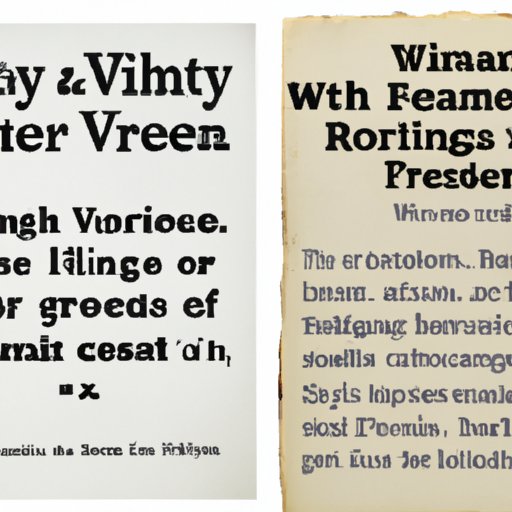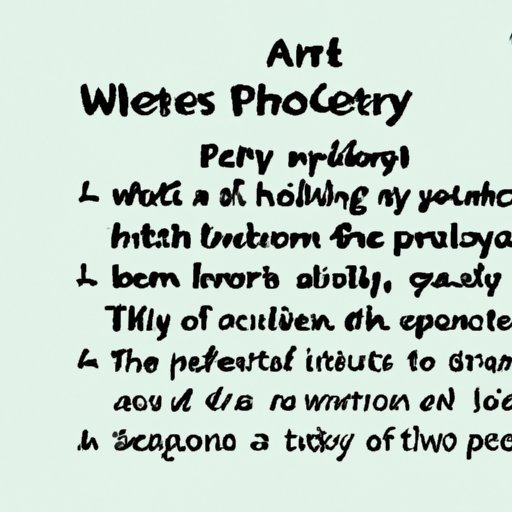Introduction
Poetry has been a form of expression for centuries, and free verse stands out as one of the most innovative and controversial styles. The lack of established meter, rhyme, and form can be both liberating and limiting for writers, making it crucial to understand the myths and realities of free verse poetry. In this article, we aim to provide writers with a comprehensive guide to free verse, debunking its myths, outlining its basics, exploring its controversies, and discussing its benefits and limitations. By the end of the article, you will have a deeper understanding of how to write successful free verse poems that reflect your unique voice and experiences.
Debunking the Myths of Free Verse: Separating Fact from Fiction
It’s easy to dismiss free verse as “not poetry” or assume that it’s easier to write than other forms of poetry. However, these assumptions are far from reality. Free verse is a legitimate form of poetry that requires skill, creativity, and technique. It’s not just randomly written words without structure or intent. Rather, each word is carefully chosen and placed to convey meaning and evoke emotion.
Breaking Down the Basics of Free Verse: What Every Writer Should Know
Free verse is a form of poetry that does not adhere to traditional structures. It lacks fixed meters, rhyme schemes, or forms found in sonnets, haikus, or villanelles. Instead, it emphasizes the natural rhythms and musicality of the language, allowing writers more freedom to create unique and authentic expressions. Some well-known examples of free verse poems include “The Waste Land” by T.S. Eliot, “Song of Himself” by Walt Whitman, and “Howl” by Allen Ginsberg.
The Fine Art of Free Verse: How to Master the Form and Find your Voice
Writing free verse requires not only an understanding of its basic features but also a mastery of language and a sense of creativity. Paying attention to sound, line breaks, figurative language, and imagery can help writers create successful free verse poems that stand out. Clarity, coherence, and emotional impact are also crucial elements of successful free verse.
The Controversy of Free Verse: Why Critics Are So Divided
Despite its creative potential, free verse has faced criticisms over time. Critics have argued that it turns poetry into prose, lacks structure, and makes it difficult for readers to understand the poem’s intent. However, counterarguments suggest that free verse is a valuable tool for expressing authenticity and originality. It doesn’t lack structure, but rather creates its own unique framework that transcends traditional forms.
The Benefits and Limitations of Free Verse: Exploring the Pros and Cons
Free verse offers writers a variety of benefits, including flexibility, freedom, and innovation. It can also help writers tap into emotions and experiences that traditional forms may not capture. However, free verse’s lack of structure can also be a limitation, making it challenging to edit and refine. Writers must find the right balance between creative expression and clear communication to ensure their readers can understand and appreciate their work.

From Whitman to Ginsberg: A History of Free Verse and Its Place in American Poetry
Free verse has a rich history that has influenced poets across different styles and eras. Its origins can be traced back to the 19th century, with the introduction of Walt Whitman’s “Song of Himself.” This influential poem marked a significant departure from traditional forms and marked a new era in poetry. Later in the 20th century, poets like Allen Ginsberg pushed the boundaries even further with their experimental style and political messages. Today, free verse continues to shape and redefine the poetic landscape.
Writing with Freedom: How Free Verse Can Help You Express Yourself More Authentically
In conclusion, free verse offers writers a powerful means of expression, enabling them to create authentic and original works that speak directly to their experiences and emotions. While it may seem daunting at first, with practice and dedication, writers can master the form and achieve success. Embrace free verse as a unique and valuable style of poetry, and let your voice shine through.
